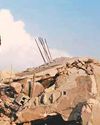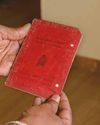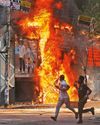
A Searing Memory American activist Rachel Corrie tries to stop an Israeli bulldozer from destroying Palestinian homes in the Gaza strip WHAT do we remember when we remember a colonial war—an anti-colonial resistance, a fight against oppression, occupation and apartheid? Of course, we remember many things but we also forget many. But something that becomes defining for memory is defiance. Of course, we will remember deaths, ruins and rubble. But what remains is not the ruins, but the gestures of defiance! Not the rubble, but the rebellious signs.
Remember what you want to remember from the anti-colonial resistance. In our reminiscence remains the young Palestinian boy Faris Odeh standing in front of an Israeli tank. We remember American peace activist Rachel Corrie standing in front of an Israeli bulldozer to protest the demolition of Palestinian houses. From the last year, we remember Palestinian journalist Wael al-Dahdouch, the man who kept reporting while his family members were being killed by the Israeli forces. From the last century, we remember Che Guevara dying, looking into the eyes of an assassin, marking defiance. We remember Bhagat Singh and Birsa Munda from the gallows. It is ultimately defiance that fuels our memory of the colonial war and anti-colonial resistance.
Brahma Prakash IS ASSISTANT PROFESSOR AT THE SCHOOL OF ARTS AND AESTHETICS INU AND THE AUTHOR OF BODY ON THE BARRICADES
In the book, Children of the Days, Eduardo Galliano tells the story of an Indian indigenous rebel, Manuela Leon. On 8 January 1872, the president of Ecuador executed her to provoke the Indian Indigenous population to rise against forced labour. On the day of the sentence, Manuela faced the firing squad without a blindfold. Asked if she had anything to say, she said, ‘manapi’ (nothing) and silently put up her defiance. It is the acts of dissent and defiance that foster our reminiscence.
This story is from the January 21, 2025 edition of Outlook.
Start your 7-day Magzter GOLD free trial to access thousands of curated premium stories, and 9,000+ magazines and newspapers.
Already a subscriber ? Sign In
This story is from the January 21, 2025 edition of Outlook.
Start your 7-day Magzter GOLD free trial to access thousands of curated premium stories, and 9,000+ magazines and newspapers.
Already a subscriber? Sign In

Nomadland
All eyes are on President-elect Donald Trump and his policy on immigration

Far from Home
We have forgotten the plight of Afghans who fled to India, and continue to suffer

Bang Bang That Awful Sound
What happens when we listen closely to the soundscape of war?

Refugee Dilemma
For most Indian-origin Sri Lankan Tamils, who are victims of ethnic conflict and civil war, proving that they are not illegal migrants is a nearly impossible task

They Poured Fire on Us
The resilience of refugee women from Sudan, Ethiopia and Yemen in the face of war and displacement is remarkable

The Sound and the Fury
Iraqi poet, novelist, translator and scholar Sinan Antoon was born and raised in Baghdad.

The Day I Became a Woman
In a country where authorities have been directly engaging in the gruesome war against women for decades, artists like Nahid Hassanzadeh stand apart as a voice of dissent–a haunting reminder of the unwavering spirit of the rebellious Iranian women fighting against the Islamic Republic’s violent crackdown.

The Kite Runner
The official figure of civilian deaths in Afghanistan is a serious underestimate. It is unlikely that we will ever know the real cost of Afghan lives

American Patriot
Barring a few exceptions, Hollywood movies continue to be gung-ho about the United States' penchant for waging wars across the globe

The Hunters
How can Bangladesh's fractured society, burdened by layers of trauma, begin to heal?
